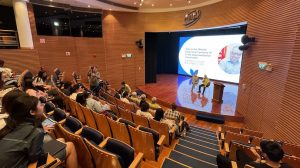A team of researchers from IFTM has published new research with suggestions on the use of augmented reality as a marketing tool for in-person visits. The work focused on the varied dimensions of authenticity, taking as a base scenario an augmented reality, at-home tourism experience.
The researchers pointed out that online, armchair tourism has grown in popularity recently due to travel restrictions linked to the COVID-19 pandemic. As the linkage of information technology to tourism “continues to accelerate”, consumers’ demand for “authenticity in information technology experiences is further increasing,” the authors said.
The study was carried out by IFTM researchers Mr. Chris Zhu Zhengan, Dr. Yan Io Man U, Dr. Henrique Fátima Boyol Ngan, and Ms. Rachel Luna Peralta. The findings were featured in the academic paper “Understanding augmented reality marketing in world cultural heritage site, the lens of authenticity perspective”. It was published in April in the online version of the Journal of Vacation Marketing.
The research results were based on an online questionnaire answered by 240 respondents who are all from the Mainland. To be eligible for participation, the respondents had to confirm personal use of an augmented reality application featuring China’s Mount Tai, and also had to confirm they had never visited the location in person. Located in Shandong Province, the mountain is of historical and cultural significance and is listed as a UNESCO World Heritage site.
Spurring real-life tourism
The purpose of the study was to identify the relationship between different dimensions of authenticity in the context of an augmented reality, at-home tourism experience, and how it could impact virtual tourists’ willingness to make an in-person visit to the place.
According to the authors, authenticity in tourism generically falls under 3 categories. The first, defined as ‘objective authenticity’, refers to a tourist’s perception of the attributes of a place.
The second, ‘constructive authenticity’, is a tourist’s own projected notion of the attributes of a toured place. “Thus, constructive authenticity is not necessarily associated with reality, but may come from stakeholders’ shared interpretation and construction of it,” the IFTM team pointed out.
The third is ‘existential authenticity’. This puts “more emphasis on a subjective psychological feeling, which is influenced by factors such as the interactivity of the experiential process”.
Findings from the study indicated that respondents’ perceptions related to constructive and existential authenticity “positively” predicted satisfaction regarding their at-home tourism experience, and hence their willingness to visit the actual destination. Perceptions of objective authenticity, on the other hand, had “no significant impact” on respondent satisfaction in the context of an augmented-reality, at-home tourism experience.
The study also found that respondent satisfaction was higher when participants reported good levels of existential authenticity, as compared to constructive authenticity. “Considering that existential authenticity places more emphasis on a subjective perception of the tourism experience, it is important for destination managers to consider how to enhance” the user’s experience of augmented reality tools, the IFTM team stated. To achieve that, the researchers suggested resorting to “interesting storytelling” or the addition of interactive elements.
Finally, the authors concluded that, “given the richness of the information technology tourism experience”, users may not be in pursuit of absolute objectivity when embarking on an augmented reality, at-home tourism experience: instead, people might “be more concerned with how they feel” during the activity.
More info
IFTM Assistant Professor Dr. Yan Io Man U holds a PhD from the University of South Australia. She started her higher education studies with a bachelor’s degree from IFTM. Her research interests include tourist experience and behaviour in relation to heritage tourism, hospitality and nostalgia tourism. Dr. Io also serves on a range of academic and industry-related committees.
Dr. Henrique Fátima Boyol Ngan is an Assistant Professor at IFTM and specialises in psychology. He holds a PhD in that field from Macau’s University of Saint Joseph. Prior to joining IFTM, Dr. Boyol Ngan worked on projects related to training and organisational culture in the gaming industry.
IFTM Lecturer Ms. Rachel Luna Peralta has a master’s degree in English from the Abra State Institute of Sciences and Technology, in the Philippines. She also holds a master’s degree in Management from the Divine Word College of Bangued, also in the Philippines. Her academic research interests are related to second-language writing, cognitive processes of writing, English-language studies, campus journalism, destination image, and intangible cultural heritage.
https://doi.org/10.1177/13567667221090990









